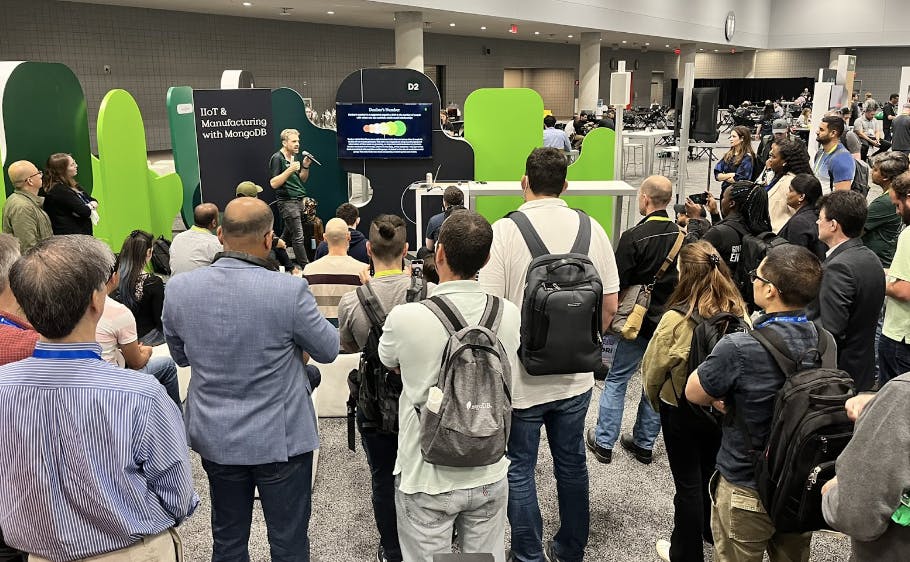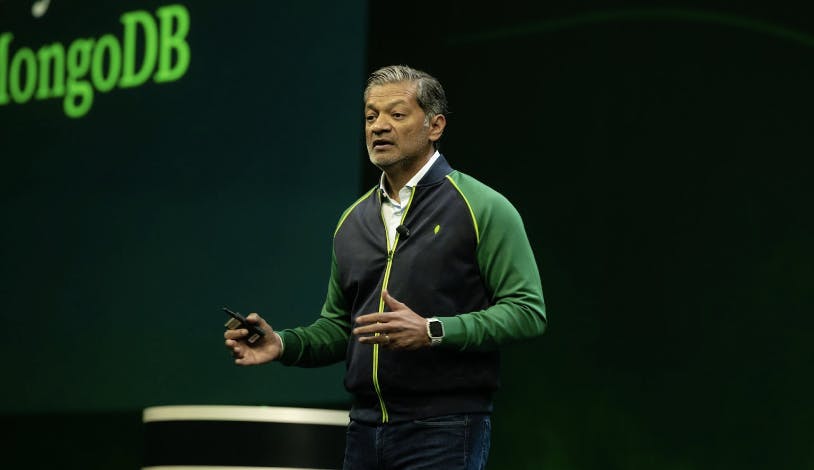When you return to a normal routine after a long break, you find out how much you miss your old routine. After hosting MongoDB World remotely for two years, we were happy to get back to seeing people in person — almost 3,000 of them. Here’s a quick rundown of the top 10 things we learned at MongoDB World 2022.
1. Queryable Encryption was a hit
How many times have you been to a concert and the opening act winds up being as good as the band you actually went to see? Queryable Encryption was like that at MongoDB World 2022. While a lot of attendees came to learn about MongoDB Atlas Search or Atlas Serverless Databases, they were equally intrigued by the ability to encrypt data in use and perform rich, expressive queries on encrypted data. This groundbreaking innovation is the result of a collaborative effort between Brown University cryptographer Seny Kamara, his longtime collaborator Tarik Moataz, and MongoDB.
2. Developers are in the driver's seat
Starting with the opening keynote by MongoDB CEO Dev Ittycheria, MongoDB World reinforced the notion that developers are the key to the future success and productivity for today’s organizations. “Every product we build, every feature we develop, is all geared toward developer productivity,” Ittycheria said. In fact the entire event centered on powerful new tools that are now available in our developer data platform.
In the Partner Promenade, dozens of vendors showed how they’re helping developers become faster and more productive. As Søren Bramer Schmidt, chief architect and founder of Prisma, explained, “New generations of developers are much bigger, and we can invest in better tooling for them. It’s an exciting time to be building tools for developers.” As the world increasingly goes digital, developers will be the key to companies’ success. Services, products, and advancements are inherently tied to the ability of developers to quickly build, iterate, and release.
3. Everyone's data is in motion
The volume of data moving to the cloud is unprecedented. In a session titled “Connecting Distributed Data to MongoDB With Confluent,” Joseph Morais, cloud partner solutions architect for Confluent, cited a study that predicted 75% of all databases would be on a cloud platform by 2022. MongoDB senior vice president of product management, Andrew Davidson, said, “MongoDB has really broken through with the MongoDB Relational Migrator at the perfect time, since so many enterprises are accelerating their efforts to get off legacy relational databases and legacy on-premises estates to move to MongoDB Atlas.”
4. Public cloud security is not as easy as some people think
While scores of businesses are increasing their cloud footprints with new cloud-native services and applications, securing them is becoming increasingly complex. Steve Walsh, senior solutions architect at MongoDB, gave a session titled “Securing Your Application's Data in the Public Cloud” and cited constantly changing cloud deployments and security policies in multi-cloud environments as reasons why security can be three times more complex in a multi-cloud environment. According to an ITRC study that Walsh cited, failure to configure cloud settings properly caused 30% of data breaches in 2021. MongoDB Atlas is designed to be secure by default, which simplifies the process of restricting access to sensitive data.
5. Ray Kurzweil might be even more prescient than he realizes
On Day 3 of MongoDB World 2022, best-selling author, pioneering inventor, and futurist Ray Kurzweil delivered a wide-ranging keynote address covering everything from computational power to vaccine trials to life expectancy and literacy rates. In the address, Kurzweil said it was likely that an AI would pass a Turing test by 2029. Just days later, news reports came out about a Google engineer who’d been fired after claiming that an artificial-intelligence chatbot the company developed had become sentient, though the company dismissed the claims.
6. Attendees were eager to try MongoDB
It’s easy to assume that everyone who came to MongoDB World was already using it and wanted to know about new features and capabilities. But in the Learn Booth at the event, plenty of visitors weren't using MongoDB at all — they were there to discover and evaluate. In the Ask the Experts booth, roughly one in 10 people asked about how to prepare to migrate to MongoDB. One of the most common questions we heard was, "How do I convert relational schemas to the document model?" We have tools like Relational Migrator to help with that. We also recommend training for developer and ops teams, including our MongoDB for SQL Pros university course and our Developer-Led Training programs to ramp them up on what makes MongoDB different from SQL.
7. Developer friction comes in many forms
The opening keynote address and product announcements set the stage for many of the conversations we had over the next few days. We consistently heard from developers about the friction points that we could help eliminate for them, and how reducing developer friction results in real benefits — apps and services get launched that could not have existed otherwise because of the toll that complexity takes on development teams’ bandwidth. Atlas Serverless databases are going to be a big part of getting those new services off the ground because it’s one less thing developers have to worry about. And the MongoDB CLI allows developers to interact with our services using the method they’re familiar with — especially advanced developers who prefer control and speed over a more visual interface.
8. @MarkLovesTech draws the crowds
MongoDB CTO Mark Porter was the center of the action at the event. Wherever he went, a crowd would gather, eager to meet, exchange thoughts, and ask questions. His talks during the Builder’s Fest were standing room only.
Clik here to view.

9. Every software company needs custom track jackets
Our field marketing team knocked it out of the park with the custom track jacket. After MongoDB CEO Dev Ittycheria debuted the jacket during the Day 1 keynote, it immediately became the most desired piece of swag of the show. A few lucky contestants won their own track jackets during the Builder’s Fest. Developers are either highly fashion-conscious or avid joggers.
Clik here to view.

10. There's no replacement for in-person gatherings
For almost three years, we’ve been getting by with remote events and Zoom calls, but we learned at least two more things from MongoDB World 2022: There’s no replacement for real-life, in-person experiences, and remote interactions actually require a different set of skills. “It is not impossible to talk with people on Zoom. But it requires so much more intentionality,” Mark Porter said. “My takeaway from MongoDB World is making sure that in this new hybrid world, we can talk with people! But even on Zoom, we must become much more focused on the intentionality of talking with them because it is so much different."